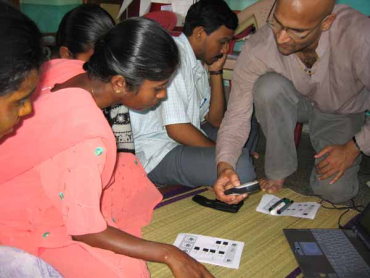
Fourteen years ago, from a state-owned monopoly, the telecom market was thrown open to private and foreign players.
With competition, the biggest beneficiary of all of this has been the customer who enormously benefited from the lowest mobile phone tariffs in the world of less than one US cent per call, besides choice of technology, GSM or CDMA.
Even the state-owned enterprises BSNL and MTNL entered the fray. India now has over 846 million phone subscribers, 96 per cent of which are for mobiles.
...

This revolution has gone beyond the big metropolises, smaller cities and towns to penetrate rural India.
One big spin-off of this boom is the possibility of innovation blowback to emerging markets like Africa.
Leading players from India are closely tracking the business opportunities in penetrating the Dark Continent because its telecom market is the most underdeveloped and spread over a vast geographical area.
The market has low rates of penetration with only three to four operators - unlike the highly competitive situation in India where most global giants have a presence but only a few players like Bharti Airtel remain profitable despite rock-bottom tariffs, thanks to innovations.
...

This has allowed it to invest a minimum amount to set up a network that can handle a threshold level of calls and then wait for the usage to build to spend more.
All of this comes in handy for this company that recently paid a handsome sum of $10.7 billion to acquire the African assets of Kuwaiti company, Zain.
The good news is that this business has acquired critical mass to persuade global equipment majors like Nokia and Motorola to locate their plants in India.
...

This welcome spillover from the boom in mobile telephony is the focus of a recent working paper* of Professor Sunil Mani of the Centre for Development Studies, Thiruvananthapuram.
For starters, the boom in telecom services is definitely leading to greater domestic manufacture of equipment.
This perfect correlation between the growth of the services sector and equipment sector is bound to become more significant in the future.
Although this growth is led by MNCs, there are a number of Indian manufactures who have sprung up like Micromax, Spice, Karbonn, Lava, lemon and Max.
Of late, even Bharti is also entering the manufacturing space.
...

Even one of the oldest and leading telecom manufacturers in the public sector, ITI, whose product line was dominated by fixed line equipment has contained some of its recent losses by engaging in manufacture of mobile sets since 2005-06.
Although the import dependence of such domestic manufacture has been somewhat high because it is based on components and indeed technology from abroad, the good news is that domestic value-addition has registered impressive strides.
...

Local value-addition, although low, is also bound to show increases in the future. Over the last four years or so, an interesting fact cited in the working paper is that the growth of domestic manufacturing of telecom equipment has gone hand-in-hand with growing exports.
The lion's share of such exports are mobile handsets. India, in fact, is now a net exporter of such mobile handsets.
Although mobile telephony is a poster boy of reform, there is tremendous scope for public policy - for instance, in increasing the technological capability of local firms and the local value-added of equipment that is getting manufactured within the country.
Policies are required for raising local content. The upshot of the working paper is that "the state still has an important role to play in this regard and the new telecom policy that is on the anvil must squarely address this important issue".
* The Mobile Communications Services Industry In India: Has it led to India Becoming a Manufacturing Hub for Telecommunication Equipments?; Working paper number 444, April 2011
From the Ivory Tower makes research from the academic world accessible to our readers